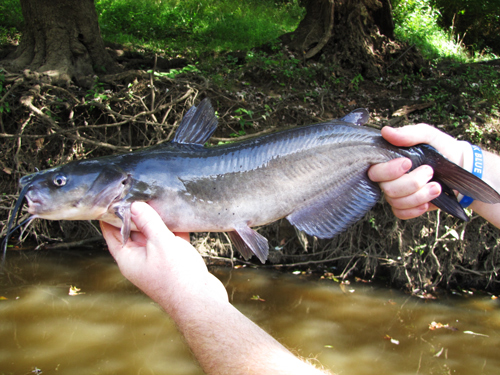BY Kevin Kelly
(Editors: This is the eighth and final installment of the “Spring Fishing Fever” series of fishing articles. Produced by the Kentucky Afield Outdoors staff, the series details productive fishing opportunities across Kentucky).
FRANKFORT, Ky. – A stable weather pattern this week brought an early taste of summer to Kentucky as high temperatures topped 80-degrees on consecutive days.
Warmer weather and water temperatures climbing into the 70s tell catfish that it’s time to spawn, and anglers who pursue them know from experience the period from late spring into early summer is prime time.
“The next couple of weeks look good for catfish because they’re going to be aggressive and feeding,” said Kevin Frey, eastern fisheries district biologist for the Kentucky Department of Fish and Wildlife Resources.

Channel catfish, blue catfish and flathead catfish are the most sought after catfish species in Kentucky, and the most widely distributed of those is the channel catfish.
The Kentucky Department of Fish and Wildlife Resources annually stocks roughly 100,000 channel catfish across the state. About 30 percent of that amount is allocated to Fishing in Neighborhoods (FINs) lakes.
These popular urban fisheries can receive heavy fishing pressure but are stocked frequently with a variety of fish species to meet the demand. More than two dozen FINs lakes statewide are due to receive stocker-sized channel catfish this month. The stocking schedule for FINs lakes is available on Kentucky Fish and Wildlife’s website at fw.ky.gov.
“A lot of the time the catfish do bite really well right after we stock them,” said Dane Balsman, urban fisheries biologist for Kentucky Fish and Wildlife. “And you don’t have to have a really fancy set up to catch them.”
A 7- to 9-foot medium to heavy action spinning rod with a matching spinning reel spooled with 20-pound line and outfitted with a simple slip sinker rig is a capable outfit. To assemble the rig, tie a 4/0 circle hook onto an 18-inch fluorocarbon or monofilament leader. Tie a barrel swivel onto the other end of the leader, then take the main line and thread it through a ½- to ¾-ounce egg sinker and plastic bead before tying the line to the other eyelet of the barrel swivel.
Channel catfish have olive-brown to bluish-slate backs, white bellies and pale gray sides, often adorned with small black spots. Adults range from 12 to 32 inches long. They scavenge the bottom using their whiskers to sense the presence of food.
Nightcrawlers, chicken livers, cut pieces of shad or skipjack herring, shrimp and scented dough baits are among the most widely-used and productive baits for channel catfish. Try fishing these baits in areas with undercut banks, stumps or logs and rocky banks and points.
“Catfish are going to look for a cavity to get back in to spawn,” Balsman said. “They get in there and lay their eggs and protect those eggs.”
Low-light periods – such as around dawn and dusk or at night – tend to be the best times to catch catfish.
“Sandy clay shallow areas are another alternative especially if there’s some vegetation,” Frey said. “Those shallow water areas are still going to be good into June. As the water continues to warm, catfish will come in to the shoreline at night and drift back out to the open water during the daytime.”
From Lake Barkley and Kentucky Lake in the west to the Ohio River to Dewey Lake, Fishtrap Lake and Yatesville Lake in eastern Kentucky, there is an abundance of places across Kentucky holding excellent populations of channel catfish.
The “Where to Fish” feature on Kentucky Fish and Wildlife’s website is a handy tool for those looking to find a place to fish for catfish. As an example, anglers can search for waterbodies that hold channel, blue and flathead catfish and offer bank or fishing pier access. The department’s annual “Fishing Forecast” is another valuable resource available online.
One evening last week at a FINs lake, a father and son looking to squeeze in some fishing before sunset encountered an older angler seated on a plastic bucket waiting for a catfish to bite and tug his pole float under.
The man had a question for the boy.
“Are you going to catch all the fish?” he asked playfully.
The boy stopped and thought about his response for a moment.
“No,” he said nervously and then continued to scout the bank for the perfect spot to set up and try for a catfish.
Pieces of frozen shrimp stained red from a marinade in strawberry Kool-Aid mix fished weightless on the bottom as far out as he could cast enticed two channel cats in short order. The fillets those fish yielded filled his belly two nights later and the experience left him wanting to fish for catfish again sometime.
The next several weeks are as good a time as any for catfishing in Kentucky.
Author Kevin Kelly is a staff writer for Kentucky Afield magazine, the official publication of the Kentucky Department of Fish and Wildlife Resources. Get the latest from Kelly and the entire Kentucky Afield staff by following them on Twitter: @kyafield.


Be the first to comment